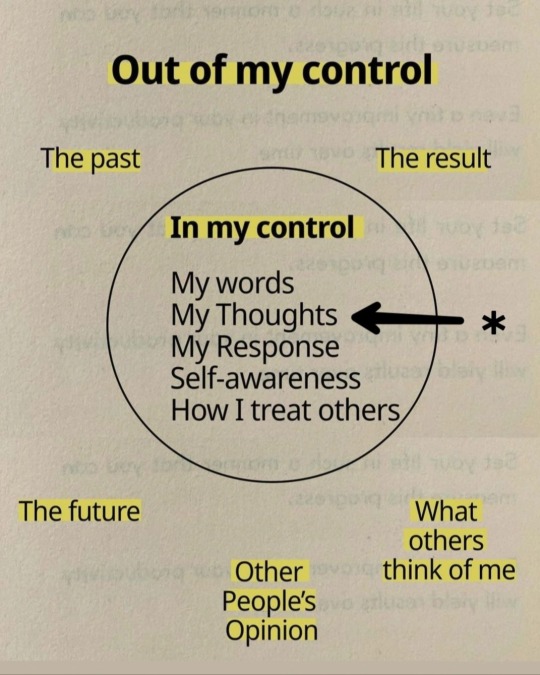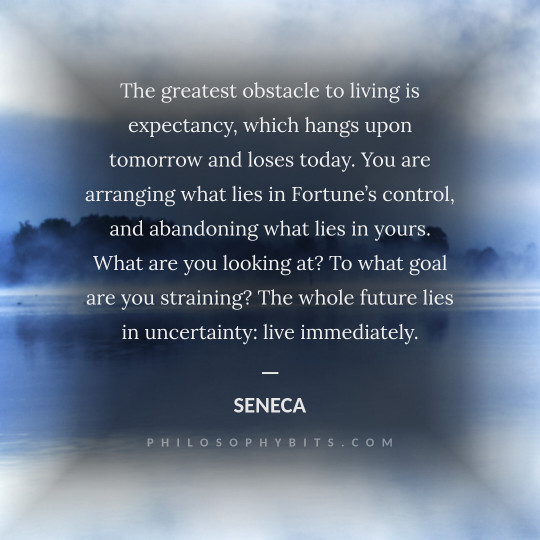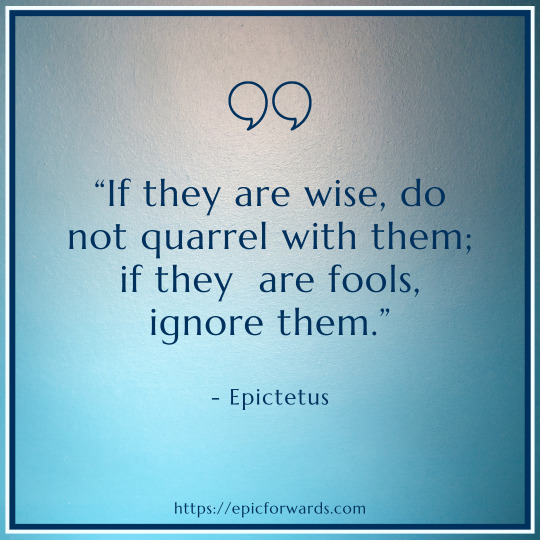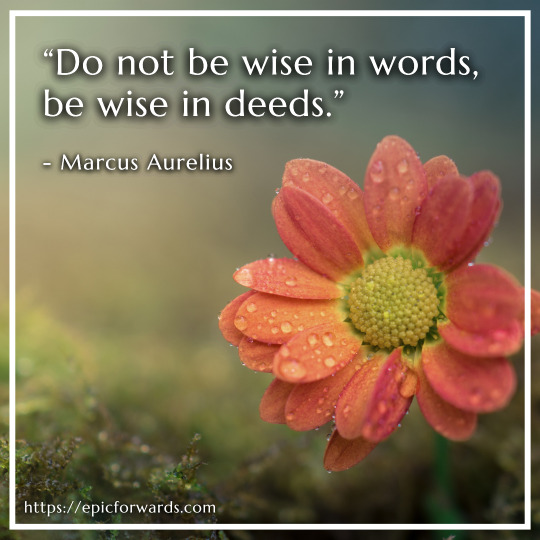#stoics
Text
“Accept death in a cheerful spirit, as nothing but the dissolution of the elements from which each living thing is composed. If it doesn't hurt the individual elements to change continually into one another, why are people afraid of all of them changing and separating? It's a natural thing. And nothing natural is evil.”
- Marcus Aurelius
#literature#roman emperor#marcus aurelius#meditations of marcus aurelius#stoic philosophy#stoics#stoicism
302 notes
·
View notes
Text

* You're not responsible for every thought that comes in and out of your head. They're not necessarily within your control, not initially anyways.
It is within your power, however, to decide which ones you want to hold on to and those you wish to discard.
You're responsible for observing thoughts that flow inward and choosing whether or not you act on them, buy into them, or take ownership of them.
#KnowThyself
#TheWolfYouFeed
#IsTheOneThatWins
#stoicism#stoics#the stoics#western philosophy#philosophy#self improvement#know thyself#greek aphorism#delphic maxims#apollo#temple of apollo#Delphi#the wolf you feed#the wolf you feed is the one that wins#proverb#two wolves
252 notes
·
View notes
Photo

Marcus Porcius Cato (the Younger)
181 notes
·
View notes
Text
“So you want to live ‘according to nature?’ Oh, you noble Stoics, what a fraud is in this phrase! Imagine something like nature, profligate without measure, indifferent without measure, without purpose and regard, without mercy and justice, fertile and barren and uncertain at the same time, think of indifference itself as power – how could you live according to this indifference? Living – isn’t that wanting specifically to be something other than this nature? Isn’t living assessing, preferring, being unfair, being limited, wanting to be different?”
Beyond Good and Evil, Friedrich Nietzsche
#beyond good and evil#friedrich nietzsche#Nietzsche#life#living#nature#stoics#stoicism#unfair#indifference#philosophy#favorites
43 notes
·
View notes
Text

#philosophy#quotes#Seneca#On the Shortness of Life#life#expectations#uncertainty#luck#fortune#stoics#stoicism
34 notes
·
View notes
Text

"If they are wise, do not quarrel with them; if they are fools, ignore them."
-- Epictetus
#epictetus#stoicism#marcusaurelius#stoic#philosophy#seneca#stoicphilosophy#wisdom#philosopher#dailystoic#socrates#carljung#philosophyquotes#stoicquotes#stoicmindset#mindset#quotes#growthmindset#strengthquotes#aristotle#psychology#stoics#meditation#friedrichnietzsche#philosophical#wisequotes#plato#motivation#quoteoftheday#voltaire
7 notes
·
View notes
Text
Stoicism teaches us that we should never think of the things in our life as something we lost, but instead, as something we had to eventually return. Your favorite coffee mug falls and breaks, your child dies, your dog gets old. Nothing in life is forever and everything breaks down or dies or leaves, eventually. So instead we should think of things in terms of, "return." You didn't lose these things because they were never yours to begin with, as they were a gift from coincidence, but the time for them to be returned has come; and a new gift will soon be on its way.
#stoicism#stoics#philosophical#philosophy#high thoughts#deep thoughts#greiving#loss#pet loss#parenting#children#love#mentally unstable#mentally fucked#mentally exhausted#mentally tired#tired of life#tired of this shit#bpd problems#bpd sucks#bpd#bpd mood#actually bpd#bipolar disorder#actually bipolar#possession#wholesome#wholesome post#high asf#stoner blog
67 notes
·
View notes
Quote
He suffers more than necessary, who suffers before it is necessary.
Seneca
26 notes
·
View notes
Text

Il momento presente, questa scheggia di luce fra l'abisso del passato e l'oscurità del futuro (leggendo i Pensieri di Marco Aurelio nel commento di Pierre Hadot)
#fotografia#photography#roma#bluehour#foto#photo#archeologia#archeology#philosophy#stoics#filosofia#stoicism#stoicismo#long exposure#photographers on tumblr
2 notes
·
View notes
Photo

Tim Bissell discovers Marcus Aurelius: “Death had never been an easy hill for me. I looked upon it with unease and climbed it (and we’re all climbing it, every day, without pause) with unalloyed dread. Thoughts of death—my own, certainly, but everyone else’s too—often gave me night terrors so intense that I had to get out of bed and walk around the house, touching things to ground myself. I eventually learned a calming trick, devised for me by the one and only therapist I’ve ever consulted. Unfortunately the trick stopped working after a while, at which point I decided to let the terror happen when it happened. To try to live in it. Lying there, terrified, I’d whisper to myself, Just be brave.”
[Time Is a Violent Stream :: by Tom Bissell :: On losing a father and finding Stoicism :: Harpers Magazine]
15 notes
·
View notes
Quote
Pleasures, when they go beyond a certain limit, are but punishments.
Marcus Aurelius
11 notes
·
View notes
Text

It's certainly less observed but at least equally true of the character of someone who whether by dumb luck, inheritance, or the fruits of their own labor become hyper successful professionally, or acquires high levels of economic status.
Think of someone you know and marinate on who they might become if they ascended to a "fuck you money" level of income tax bracket.
How might they behave when they are no longer forced to choose their battles and were not bound to the diplomatic necessities of those who must preserve their reputation and livelihood, and answer to employers and authorities while lacking access to top tier legal representation and connections?
Who are you, who do you become, when you're on the summit looking down?
That's who you are now.
Who you truly are is who you would be if you could afford to get away with it.
#epictetus#stoicism#stoics#the stoics#stoic philosophy#greek philosophy#philosophy#western philosophy#character#writing#just my thoughts
46 notes
·
View notes
Text
When is anger justified? A philosophical inquiry - Delaney Thull
youtube
1 note
·
View note
Text
On going slow
This is the first of a series of longish posts which will like become more usual from me going forward. It's about the importance of going slow, how I've been trying to work on this for the past few weeks, how I've been benefitting from it, and hopefully, how it can benefit you too! This is all about working on the 'self', which goes hand in hand with a healthy approach to life and, by extension, to writing. I hope you will find it interesting and valuable. Thank you!
Lately, I have been trying to do things slow, not just with my writing, but in my life as well. This is something I picked up from positive psychology, in particular Martin Seligman. I have read a lot around positive psychology, and I am not the biggest fan of it, but I appreciate its aims and its value, and this is definitely something which I have found to be helpful for me. It probably works slightly differently in positive psychology, and it definitely does in mindfulness too -- another thing I am not the biggest fan of, but whose worth I can appreciate. Still, this is my take on it, how it works for me, and if it can work for you too, in your own particular way, then that will be good.
I have been dealing with a lot of anger lately, and going slower has helped a lot with that. Anger is a very difficult thing for me. Like, it's important to be able to blow off steam and let it all out when you're angry, but you have to be careful about how and when you do so, or it can cause harm. If my computer is not working, I will 100% shout at it, and even curse, and that is fine. But if I do that to someone, that will be a problem, and unfortunately it has happened sometimes, and that's bad.
Anger is something that lies deep within me, because it was everywhere around me growing up, and although I've got better over the years, it's still there, right beneath the surface, and it's tough. It is such a big part of me that, for a while, I thought it was tied to my very self. I thought that the only solution to prevent this anger from spilling out would be to completely shut myself off, because to deny my anger would be to deny myself, and to deny myself, I would need to sever any bond I had with others and live like a loner.
Thankfully, I soon realised that this made no sense. That anger, though strong, was just an emotion -- not a part of my 'self', but a way for me to express it, and merely one of many. So, I started thinking about a better way to go on about this problem, and that's when I remembered the whole 'living slow' thing from Seligman. If you live slow -- if you look at life as if it were passing in front of you in slow motion -- you can see things more clearly, read situations better, and make better decisions too.
I would like to clarify that for 'better' and 'clarity' here I am not talking about some objective standard of what is good according some self-appointed authority, like a therapist or a psychologist. I am talking about things being clearer to you, better for you -- from your perspective, that is. You want to go slower because it enables you to get a clearer, better perspective on things, so that you can make better decisions accordingly -- decisions that make sense to you, because you have had the chance to look at things more closely and take more time to think about them.
Mind you, there is still no guarantee that the perspective you will gain from doing this will be the full truth. In conversations with others where I have tried to go slower, I've still ended up making wrong assumptions and misunderstanding some of the things others were saying. However, because I was going so much slower, I was able to see my mistakes, apologise, and find a way to move on. It does take a lot of time to do so. Sometimes, you will have to just sit in silence and ponder things slowly within yourself before you are able to formulate a response that will move things forward. But I swear, it's worth the effort.
In a way, when I apply this to anger, it reminds me a little bit of Stoicism -- another thing I am not a big fan of but can appreciate. I am talking about the fact that you, as a Stoic person, can have control of your own emotions by simply (sort of) separating the thing which is happening to you from your own reaction to it. For example, if someone stomps your foot, yes, it hurts, but if you focus, you can separate the pain you are feeling from your reaction to it; you can feel the pain in your body but decide to react differently in your mind; in short, you will feel the pain, but you will not let it show, because you can control your emotional reaction to the pain if you really try.
Mind you, there are still instances in which even the most steadfast Stoic will yield to a knee-jerk reaction, like if a tiger appeared in front of them in the middle of the road. Surely, you would forgive the Stoic for being suddenly overcome by fear, because there was no way they could expect this, and for this reason, they will give in to it. Yet the Stoics would argue that a great Stoic, even if caught off guard, would be so only momentarily, and that thanks to their rigorous training in controlling their emotions, they should be able to immediately regain their composure, and be able to face the tiger (sort of) without fear. I imagine that, freed from fear, they will still make the very wise decision to run! But they'll be able to make that decision precisely because they did not let themselves just freeze in fear. In short, they feel the fear, realise it's an emotional reaction, dismiss it as unhelpful, and turn to a more useful, logical response. Easier said than done, I know. But that's Stoics for you.
Now, imagine doing this for anger. Especially in difficult conversations you might have with others. What would be the best way to go on about it? I've been trying to deal with this lately by going slower with anger -- not suppressing it, but letting it out slowly, in a careful, thoughtful, constructive way. I did not want to completely stop myself from feeling angry. Rather, I wanted to take a breath, hold it there, and take time to explore it.
It requires you being silent, but it's not complete silence. I'd call it a vow of 'semi-silence': you must speak, but only as much as needed, and you will do so calmly (as much as possible), clearly, and again, slowly. It's a bit like pouring hot tea from a teapot into someone's mug: you must do it slowly and smoothly, with just the right pour, or their mug will overflow, and hot tea will spill on them, and it will burn, and that's not good.
So yeah. You won't stay silent. You will say what you have to say. But you will choose your words carefully, to ensure that you're as clear as possible, so that the other person understands. You should not say everything you think, as in everything that's going through your mind, as not all of that is helpful, nor true, and likely not what you really think. But you must say what you need to say, as in what is necessary, what is absolutely vital, and you must go through all of it, slowly but surely, to achieve clarity.
I appreciate that, to some, this might sound a bit artificial, like you're not letting you be your 'true self' or something. But again, I insist, that is just not correct: you are not your anger -- it's just an emotion, not a part of your 'self'. Of course, it is important that you let yourself feel emotions, as they are an important way for you to express yourself and feel alive. However, you are not your emotions. You are not your anger. You are not your fear. You are you. Just because you have been angry for a long time, it doesn't mean anger is now a part of you, forever. This is something that has been done to you, and you must do your best to undo it. I am trying very hard to get better, to move forward, to feel more like my true self, every day. It's not easy -- I know that for sure! But it's worth it, and so I'll keep trying.
By going slower, by not letting your anger get the better of you -- by sitting down with it, listening to it, without giving in, you are not denying your true self. You are not dissimulating, you are not pretending, you are not hiding a part of yourself from others. Rather, you are acknowledging that this is something you are experiencing, but that's not you. You're just going through it, taking it in -- trying to appreciate it, to understand it -- then moving past it. It's a bit like looking at a work of art. As your eyes peer all over it, you will feel all kinds of emotions -- you'll feel anger, you'll feel sorrow, you'll feel despair. But then, you can't stop there: you must learn from it, you must take from it what it has to tell you, and then, move forward.
So, as you are sitting there, with your anger wrapped tightly around your self, you must remember that your anger is not your self, but even so, it has value. You must listen to your anger, to its story, and take in everything you can. But then, once you're done, you must let go of it and move on. You must seek peace with yourself, with those around you, with the world. You must go forth, and live slow, but live, and feel more like your true self, every day, little by little.
I don't think I have it all figured out. We'll see whether going this slow will be sustainable in the long run, and whether I'll be able to keep it up. I'm currently home for Christmas with my very shouty family, so I think that will be interesting -- like a test of my strength, of my progress, of whether I can actually keep this going and be happy. It's been okay for now, but it's early days, so we'll see. Still, I thought my journey so far was worth sharing, and I hope you will find it helpful too.
I don't know if this will work for you, but I know there must be a way it can. Most things don't work for me at first, but then I think about how I could make them work for me, and then little by little, I figure it out. So, if this doesn't work for you at first, think about how you could make this work for you, keep at it, and slowly but surely, you'll figure it out. And if you need any ideas, feel free to get in touch! I'm always happy to help if I can. Otherwise, thank you so much for taking the time to read through this! Take care, and take it slow!
#lone-rhapsodist#personal#writing#blog#self#reflection#anger#communication#assertiveness#slow#going slow#martin seligman#positive psychology#psychology#mindfulness#stoicism#stoics#stoic#philosophy#emotions
17 notes
·
View notes
Text

7 notes
·
View notes
Text

"Do not be wise in words, be wise in deeds."
-- Marcus Aurelius
#marcusaurelius#stoicism#philosophy#stoic#seneca#stoicphilosophy#epictetus#wisdom#carljung#philosopher#dailystoic#socrates#philosophyquotes#quotes#stoicquotes#meditation#psychology#mindset#stoicmindset#jordanpeterson#aristotle#friedrichnietzsche#growthmindset#wisequotes#plato#stoics#philosophical#motivation#suntzu#lawsofpower
7 notes
·
View notes